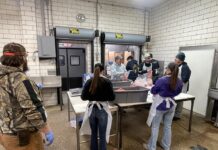Freddie Sprague got the mumps in late October, and they closed the school. That month was the best I ever had in some ways. It started off bad because Bill, our old white horse, died. Mother wouldn’t let us quit studying just because the school-house was closed, so as soon as the supper dishes were washed we had to get our books out.
— Ralph Moody, “Little Britches: Father and I Were Ranchers”
By Judith Sutherland
Farm and Dairy columnist
(Part two)
It has been said that Ralph Moody learned to write by loving to read. It is a gift to those of us who enjoy knowing about the true cowboy experiences of the old West, and it seems incredible that he wrote his first book in his 50s.
Little Britches: Father and I were Ranchers is Moody’s first book, and it stands alone as one of the finest, though it is followed by several others, all well worth reading.
Moody’s style of writing makes for wonderful read-aloud books for families, as his true experiences speak of adventure, responsibility, moral choices and the importance of building solid relationships throughout life.
Experience
Moody took great pleasure in sharing his cowboy childhood through his writing, because as life unfolded for him, he realized few people would have the full experience of the American westward movement he felt blessed to have lived in the early 1900s.
Forced into hard physical work as man of the family because of his father’s tuberculosis battles, Moody’s stories share the toil tempered by the wonderful innocence of the time. Work horses were relied upon, and the loss of Bill was enormous. A neighbor offered the use of a young colt, and this turn of events, along with the family’s best crop of peas and beans sold at the trading post one day, explains the thrill of that memorable month for young Moody.
Supplies
“You never saw so many groceries as we got that day. Besides a barrel of flour, there were hundred-pound sacks of corn meal, sugar and salt; ten pounds of seeded raisins, and cream of tartar, rice, soda and saltpeter — and a pound of Baker’s chocolate.
“It seemed we would have enough stuff to keep us fed even if winter lasted till June.”
With his personal share of the crop money, the young Moody purchased a steel trap and set about catching skunks and prairie dogs.
Hard work
The family accomplished a lot while the school was closed that month. Butchering was followed by the huge endeavor of building a corral and a dug-out cellar, a safe place to go in case of storms.
“Father said we needed to take the horses to the mountain for poles. I couldn’t figure out why we needed poles to build a cellar, but I didn’t like to ask Father. On things like that he always used to tell me I could learn more if I kept my eyes open and my mouth closed.”
It goes without saying that Moody not only quietly learned, but found the gift of the written word to share a remarkable ranching journey that lives on.












Hello, I acquired what I believe is the original unpublished manuscript of The Fields of Home by Ralph Moody. It’s titled Across the Fields. There are notations on the pages for changes. I was hoping you could give me some advice on dealing with it. Thank you, Stormy Koeller. If you can help my# is 530_338_6799. I’m in California.